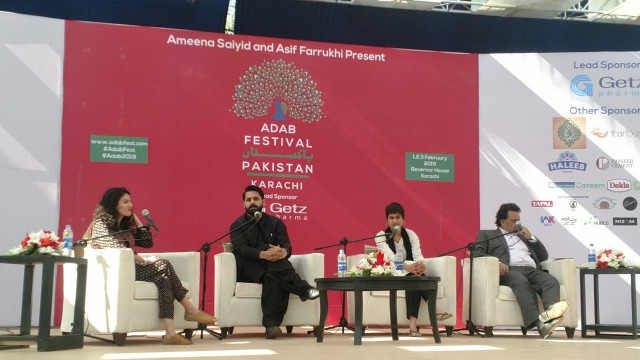All we need is a healthy dose of political activism
Panelists discuss what the future holds for youth activism in Pakistan

Panel session moderated by lawyer Palvasha Shahab, also included lawyer and human rights activist Jibran Nasir, constitutional and human rights lawyer Faisal Siddiqui and Quaid-e-Azam University professor of gender studies and Awami Workers Party member Alia Amirali. (anti-clockwise). PHOTO: MUHAMMAD SALMAN KHAN
These were some of the questions raised at a panel discussion, 'Ushering in a new era of youth activism: hope or despair?' on the last day of the Adab Festival held over the weekend at the Governor's House on Sunday.
Moderated by lawyer and human rights activist Palvasha Shahab, the panel included constitutional and human rights lawyer Faisal Siddiqui, lawyer and human rights activist Jibran Nasir and Quaid-e-Azam University professor of gender studies Alia Amirali, who also serves as a political worker associated with the Awami Workers Party (AWP).
According to Shahab, there are mainly three forms of activism prevalent in the country - 'judicial activism', such as in the case of the Baldia factory fire incident, where both the local perpetrators and foreign corporations involved in the incident have been litigated against, 'political activism', which can be seen in form of political organisation such as workers or housing unions and 'cultural activism' that mobilises communities through their social movements and cultural work such as women's rights activists, LGBTQ rights activists or the Pashtun Tahaffuz Movement.
Who makes the law?
Turning to the panelists, Shahab posed her first question: "What is the meaning of rule of law and social justice in our society?"
For Nasir, laws representing different ethnicities, creeds and religions have not been recognised in the country until now. Amirali, on the other hand, questioned who makes laws and implements them in society?
Activists want task force on girls’ education
She pointed out the need to learn from our past, where martial and censorship laws have been used by state institutions to crush political movements and any legitimate form of political activism. "Injustices that are not covered under the rule of law are not considered legitimate causes," she remarked. "The rule of law itself can be used as a political tool to limit the prevalence of justice," she added.
According to Siddiqui, the laws themselves are being used to repress and exclude people. However, the potential for liberation and justice exists within the legal system, due to which there is a love-hate relationship when it comes to establishing the rule of law.
Siddiqui went on to add that laws and constitutions have no fixed meaning. Just like sacred text, they are open to interpretation and the unpredictability of the law is that it can be used for justice and repression by a liberal judge or a conservative judge according to their ideological leanings. "We have to change the mindset of the judges who should make decisions based not on their biases, vested interests or influenced by the status quo, but according to the needs of the general public," he added.
Egalitarian or not
Shahab's next question was centred on the importance to empower the most marginalised and disenfranchised segments of the society. "Are being accommodated in our society?" she asked.
Nasir lamented the fact that the state has not been able to recognise the most disenfranchised segments of society and instead tries hard that such segments do not appear visible. He added that youth are unable to organise into student unions. Even in the recent anti-encroachment drive, he said, traders' unions were divided into groups.
"There was a time when the Turis, Mehsuds and Bangash were all at odds with another, but now we see that on the basis of an ethnolinguistic commonality, Pashtuns have been able to organise towards a non-violent political struggle in the form of the Pashtun Tahaffuz Movement," he said.
'We have to invest in youth to end extremism'
Jibran urged civil society activists to reach out to groups with whom they may have an ideological difference. "The Sahiwal incident is one example where we have seen liberals and conservatives unite towards questioning the state against police brutality," Nasir added.
What is activism?
For Amirali, the word "activism" is often used to undermine the work of political movements. She argued that while collective political processes bring out a change that is necessary for society, such change is often missed out on individualistic, neo-liberal and capitalist forms of activism.
She went on to add that "activism" is a path that is relatively easy to follow, but political work is a collective process that promotes decisions that are based on dialogue, equality and tolerance.
Amirali stressed the fact that judicial activism is influenced by heroism and decisions are often left to individuals. Individual interpretation of law leads to promote undemocratic culture, she said. "If we want to see fundamental changes in the society, we have to move away from any thoughts of despair or pessimism that have led to non-collective and individualist forms of activism," she said. "We have to come out of our comfort zones and move towards a collective resistance."
According to Siddiqui, when it comes to bringing social change, "we would have to clearly identify what are some of the most pressing issues in the country".
For Siddiqui, militant orthodoxy, political interference of the status quo and lack of representation of disenfranchised communities are major issues. "Militant orthodoxy must never be tolerated, which unfortunately has penetrated into our society", he said.
"Society cannot thrive if our political thinking is dominated by the status quo and representation of all communities is absent," Siddiqui also added.
In her closing remarks, Amirali said, "Politics is the solution to a lot of our problems. The rule of people, rather than rule of law is what we need to move forward."



















COMMENTS
Comments are moderated and generally will be posted if they are on-topic and not abusive.
For more information, please see our Comments FAQ